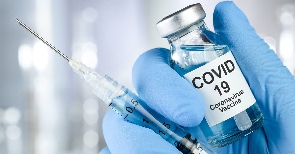Programmes Manager for the Extended Programme on Immunization(EPI), Dr. Kwame Amponsa-Achiano has reiterated that the nationwide COVID-19 vaccine rollout has been halted because the sector has exhausted the supply of vaccines in the country.
He said this in an interview with Alfred Ocansey on the Sunrise show on 3FM Friday, April 23.
Asked about the state of vaccination exercise around the country and its progress, Dr. Achiano said, “For now, I will say we are not doing active vaccination except for greater Accra, which is left with a few doses for those with underlying conditions so that when they visit their clinics they get them, apart from that we do not have active vaccination going on as of now”.
He pointed out that vaccination exercises in other parts of the country like the Northern zone has ended because his outfit has achieved the target they set for themselves.
“In a way I will say yes, the target that we set for ourselves, I’ll say have been achieved but that is not to say that because we have achieved those targets we have stopped, it is because we do not have any vaccine in stock as of now. I believe you have been following events around the globe about some African CDC(Center for Disease Control) talking about vaccines and the fact that we have some difficulties”.
He pointed out that even though his outfit has exhausted their supplies, there are a few doses left for buffer, since the EPI will not deplete the supplies to zilch.
On the question of when Ghana will receive the next batch of vaccine supply, Dr. Achiano answered that, “yes you’ll remember a couple weeks ago we had a conversation on this and the fact there’s going to be delays but we have indications that in May we will get some, I’m talking about AstraZeneca, for those who have received the first dose so we may delay a bit but we’re still within the time frame for optimum protection, so in May I believe we will get the vaccines”.
He further said, there’s no problem for those who have received the first jab of vaccines and to receive the second within the 8-weeks interval, “Mostly(there’s no problem) but even if it does, there’s really not a big problem, it’s just allaying people’s fears, the communication part is what is important but the evidence points to the fact that giving it 12 weeks or soon after may even be better.
“You know vaccination is a matter of trust and so when you have any uncertain circumstances around it then it becomes an issue so for us we are still very confident that, given the evidence, we still are within time. The latest evidence points to the fact that, I think it was put out about a week ago by the Director General of the Ghana Health Service himself, to the fact that we had set out 8 weeks as the minimum duration for getting the second dose.
“Generally, in vaccines we do not have a maximum, we have optimum durations but we do not have the maximum and then we also have the minimum, so example if you give it before a certain day or a certain date, it will be declared null and void but beyond a certain period is not an issue, except that you would want the maximum benefit or optimum benefit that is why you’ll set a certain date for that. So we for example, the evidence pointed to the fact that, you could not give the second dose before 4 weeks because it will not be very prudent to do that, in other words, you’ll not get extra benefit from that, which will be too different from just one dose and that if you give the vaccine between 4 and 12 weeks, according to manufacturer, will be the best time”.
He ended by saying that, “again everybody is learning about COVID so evidence came again that giving it from 8 to 12 weeks is the best, that is why WHO put out those guideline and then lately we are getting concrete evidence that 12 weeks and even soon after is the best so that is exactly what the UK is doing now”.
General News of Friday, 23 April 2021
Source: 3news.com
Covid vaccination: We achieved target – EPI
Entertainment
















